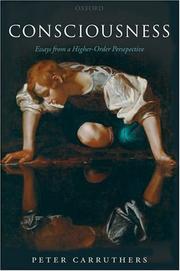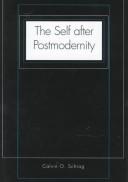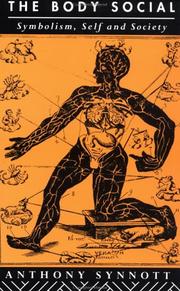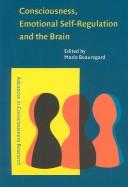| Listing 1 - 10 of 55 | << page >> |
Sort by
|
Book
ISBN: 9060691857 Year: 1973 Publisher: Rotterdam Lemniscaat
Abstract | Keywords | Export | Availability | Bookmark
 Loading...
Loading...Choose an application
- Reference Manager
- EndNote
- RefWorks (Direct export to RefWorks)
Ethics and addiction --- Toxicology --- drugs --- #GSDBP --- Edward Rosenfeld --- psychologie --- bewustzijn --- naslagwerk --- 159.96
Book
Abstract | Keywords | Export | Availability | Bookmark
 Loading...
Loading...Choose an application
- Reference Manager
- EndNote
- RefWorks (Direct export to RefWorks)
159.9 --- Bewustzijn --- Denken --- Gedrag --- Intelligentie --- Leren --- Prikkels --- Psychologie --- Sociale vaardigheden --- Waarneming --- Zintuigen --- eten (maaltijdgebeuren) --- ontwikkelingspsychologie (genetische psychologie) --- slaap --- zintuigen (receptoren) --- psychologie - inleidingen --- Psychology --- 692 --- 411 )* PSYCHOLOGIE - INLEIDINGEN --- 411 --- agressiviteit (agressie) --- bewustzijn --- geheugen --- intelligentie --- psychologie --- relaties --- (zie ook: pedagogiek, psychiatrie)
Book
ISBN: 2020192624 9782020192620 Year: 1994 Volume: *6 Publisher: Paris: Seuil,
Abstract | Keywords | Export | Availability | Bookmark
 Loading...
Loading...Choose an application
- Reference Manager
- EndNote
- RefWorks (Direct export to RefWorks)
Bewustzijn --- Cogito --- Conscience (Psychophysiologie et philosophie) --- Consciousness --- Conscience --- --Philosophie politique --- --Conscience --- #gsdb5 --- Ethics --- Guilt --- Superego --- CDL --- 1 --- Philosophie politique

ISBN: 0199277354 0199277362 9780199277360 9780199277353 0191602590 9786611198480 1435623428 0191535044 128119848X 9780191535048 9780191602597 9781435623422 6611198482 Year: 2005 Publisher: Oxford New York Clarendon Press Oxford University Press
Abstract | Keywords | Export | Availability | Bookmark
 Loading...
Loading...Choose an application
- Reference Manager
- EndNote
- RefWorks (Direct export to RefWorks)
Presenting an original theory of consciousness, Peter Carruthers provides controversial claims about the similarities and differences between human and animal minds.
Bewustzijn --- Cogito --- Conscience (Psychophysiologie et philosophie) --- Consciousness --- Philosophical anthropology --- Philosophy of science --- Apperception --- Mind and body --- Perception --- Philosophy --- Psychology --- Spirit --- Self --- Consciousness.
Book
ISBN: 9781785333385 9781782384533 1782384537 1785333380 1782384545 1322170150 Year: 2015 Publisher: New York (N.Y.): Berghahn,
Abstract | Keywords | Export | Availability | Bookmark
 Loading...
Loading...Choose an application
- Reference Manager
- EndNote
- RefWorks (Direct export to RefWorks)
Nostalgia is intimately connected to the history of the social sciences in general and anthropology in particular, though finely grained ethnographies of nostalgia and loss are still scarce. Today, anthropologists have realized that nostalgia constitutes a fascinating object of study for exploring contemporary issues of the formation of identity in politics and history. Contributors to this volume consider the fabric of nostalgia in the fields of heritage and tourism, exile and diasporas, postcolonialism and postsocialism, business and economic exchange, social, ecological and religious movem
Nostalgia --- #SBIB:39A3 --- #SBIB:316.7C121 --- 316.63 --- 316.63 Sociaal bewustzijn. Zelfconcept --- Sociaal bewustzijn. Zelfconcept --- Social aspects. --- Antropologie: geschiedenis, theorie, wetenschap (incl. grondleggers van de antropologie als wetenschap) --- Cultuursociologie: gedragspatronen, levensstijl --- Nostalgie --- Social aspects --- Cross-cultural studies --- Etudes transculturelles --- Aspect social --- Emotions --- Kulturvergleich. --- Nostalgie. --- Postkommunismus. --- Sozialanthropologie. --- Theoriendynamik. --- Anthropological aspects. --- Osteuropa. --- Türkei. --- Nostalgia - Cross-cultural studies --- Nostalgia - Social aspects
Book
ISBN: 9026516762 Year: 2001 Publisher: Lisse Swets & Zeitlinger
Abstract | Keywords | Export | Availability | Bookmark
 Loading...
Loading...Choose an application
- Reference Manager
- EndNote
- RefWorks (Direct export to RefWorks)
Cognitive psychology --- cognitieve wetenschappen --- Physiology of nerves and sense organs --- #PBIB:2002.3 --- #KVHB:Cognitieve psychologie --- #KVHB:Neuropsychologie --- #KVHB:Neurologie --- neurologie --- geheugen --- cognitieve neurowetenschappen --- Neurologie --- Hersenen --- Intelligentie --- Geheugen --- 415.4 ) Leerpsychologie --- 612.82 --- Bewustzijn --- Taal --- Waarneming --- Cerveau --- Intelligence --- Mémoire --- redactie Frank Wijnen en Frans Verstraeten --- psychologie --- intelligentie --- hersenen --- brein --- neuro-imaging --- taal --- perceptie --- aandacht --- motoriek --- bewustzijn --- 159.9

ISBN: 0691116369 0691050619 1400814642 9786612087042 1282087045 1400824699 9781400824694 9781400814640 9781282087040 9780691050614 9780691116365 9780691116365 Year: 2000 Publisher: Princeton, NJ : Princeton University Press,
Abstract | Keywords | Export | Availability | Bookmark
 Loading...
Loading...Choose an application
- Reference Manager
- EndNote
- RefWorks (Direct export to RefWorks)
Adam Seligman, one of our most important social thinkers, continues the incisive critique of modernity he began in his previously acclaimed The Idea of Civil Society and The Problem of Trust. In this provocative new work of social philosophy, Seligman evaluates modernity's wager, namely, the gambit to liberate the modern individual from external social and religious norms by supplanting them with the rational self as its own moral authority. Yet far from ensuring the freedom of the individual, Seligman argues, "the fundamentalist doctrine of enlightened reason has called into being its own nemesis" in the forms of ethnic, racial, and identity politics. Seligman counters that the modern human must recover a notion of authority that is essentially transcendent, but which extends tolerance to those of other--or no--faiths. Through its denial of an authority rooted in an experience of transcendence, modernity fails to account for individual and collective moral action. First, deprived of a sacred source of the self, depictions of moral action are reduced to motives of self interest. Second, dismissing the sacred leaves the resurgence of religious movements unexplained. In this rigorous and imaginative study, Seligman seeks to discover a durable source of moral authority in a liberalized world. His study of shame, pride, collective guilt, and collective responsibility demonstrates the mutual relationship between individual responsibility and communal authority. Furthermore, Seligman restores the indispensable role of religious traditions--as well as the features of those traditions that enhance, rather than denigrate, tolerance. Sociologists, political theorists, moral philosophers, and intellectual historians will find Seligman's thesis enlightening, as will anyone concerned with the ethical and religious foundations of a tolerant society.
316.63 --- Authority --- Self --- Transcendence (Philosophy) --- 316.37 --- 316.37 Identiteit. Individu en maatschappij. Persoonlijkheid --- Identiteit. Individu en maatschappij. Persoonlijkheid --- Philosophy --- Personal identity --- Consciousness --- Individuality --- Mind and body --- Personality --- Thought and thinking --- Will --- Political science --- Authoritarianism --- Consensus (Social sciences) --- 316.63 Sociaal bewustzijn. Zelfconcept --- Sociaal bewustzijn. Zelfconcept --- Self. --- Authority. --- Transcendence (Philosophy).

ISBN: 0585382255 9780585382258 0300068425 9780300068429 0300078765 9780300078763 Year: 1997 Publisher: New Haven (Conn.): Yale university,
Abstract | Keywords | Export | Availability | Bookmark
 Loading...
Loading...Choose an application
- Reference Manager
- EndNote
- RefWorks (Direct export to RefWorks)
Self (Philosophy) --- Postmodernism. --- Postmodernism --- 316.323.9 --- 316.63 --- 316.63 Sociaal bewustzijn. Zelfconcept --- Sociaal bewustzijn. Zelfconcept --- 316.323.9 Postmoderne maatschappij. Sociologie van het postmodernisme --- Postmoderne maatschappij. Sociologie van het postmodernisme --- Philosophy --- Post-modernism --- Postmodernism (Philosophy) --- Arts, Modern --- Avant-garde (Aesthetics) --- Modernism (Art) --- Philosophy, Modern --- Post-postmodernism

ISBN: 1134850263 128033620X 9786610336203 020320154X 9780203201541 0415103592 0415062969 9781134850266 9781280336201 6610336202 9781134850211 9781134850259 9781138147997 9780415103596 1134850255 Year: 1997 Publisher: London Routledge
Abstract | Keywords | Export | Availability | Bookmark
 Loading...
Loading...Choose an application
- Reference Manager
- EndNote
- RefWorks (Direct export to RefWorks)
In this captivating book Anthony Synnott explores a subject which has been woefully ignored: our bodies. He surveys the history for thinking about the body and the senses, then focuses on specific themes: gender, beauty, the face, hair, touch, smell and sight. He concludes with a review of classical and contemporary theories of the body and the senses. Thinking about the body will never be the same after reading this book.
Human body --- Human beings --- Homo sapiens --- Human race --- Humanity (Human beings) --- Humankind --- Humans --- Man --- Mankind --- People --- Hominids --- Persons --- Social aspects. --- #SBIB:309H524 --- 316.37 --- 316.63 --- 316.63 Sociaal bewustzijn. Zelfconcept --- Sociaal bewustzijn. Zelfconcept --- 316.37 Identiteit. Individu en maatschappij. Persoonlijkheid --- Identiteit. Individu en maatschappij. Persoonlijkheid --- Social aspects --- Audiovisuele communicatie: semiotiek --- Sociology of culture

ISSN: 1381589X ISBN: 9027251886 9027251878 9786612255298 9027295867 1282255290 142377230X 9789027251886 9781423772309 9789027295866 1588114589 9781588114587 9781588114594 1588114597 9789027251879 Year: 2004 Volume: v. 54
Abstract | Keywords | Export | Availability | Bookmark
 Loading...
Loading...Choose an application
- Reference Manager
- EndNote
- RefWorks (Direct export to RefWorks)
During the last decade, the study of emotional self-regulation has blossomed in a variety of sub-disciplines belonging to either psychology (developmental, clinical) or the neurosciences (cognitive and affective). Consciousness, Emotional Self-Regulation and the Brain gives an overview of the current state of this relatively new scientific field. Several areas are examined by some of the leading theorists and researchers in this emerging domain. Most chapters seek to either present theoretical and developmental perspectives about emotional self-regulation (and dysregulation), provide cutting edge information with regard to the neural basis of conscious emotional experience and emotional self-regulation, or expound theoretical models susceptible of explaining how healthy individuals are capable of consciously and voluntarily changing the neural activity underlying emotional processes and states. In addition, a few chapters consider the capacity of human consciousness to volitionally influence the brain's electrical activity or modulate the impact of emotions on the psychoneuroendocrine-immune network. This book will undoubtedly be useful to scholars and graduate students interested in the relationships between self-consciousness, emotion, the brain, and the body. (Series B).
Behavioral neurology --- Bewustzijn --- Brain --- Brein --- Cerebrum --- Cerveau --- Cogito --- Conscience (Psychophysiologie et philosophie) --- Consciousness --- Emoties --- Emotions --- Feelings --- Gevoelens --- Hersenen --- Human emotions --- Mind --- Neuropsychiatrie --- Neuropsychiatry --- Passies --- Passions --- Psychiatrie [Neuro] --- Sentiments --- Émotions --- Émotivité --- Neuropsychiatry. --- Consciousness. --- Brain. --- Emotions.
| Listing 1 - 10 of 55 | << page >> |
Sort by
|

 Search
Search Feedback
Feedback About UniCat
About UniCat  Help
Help News
News